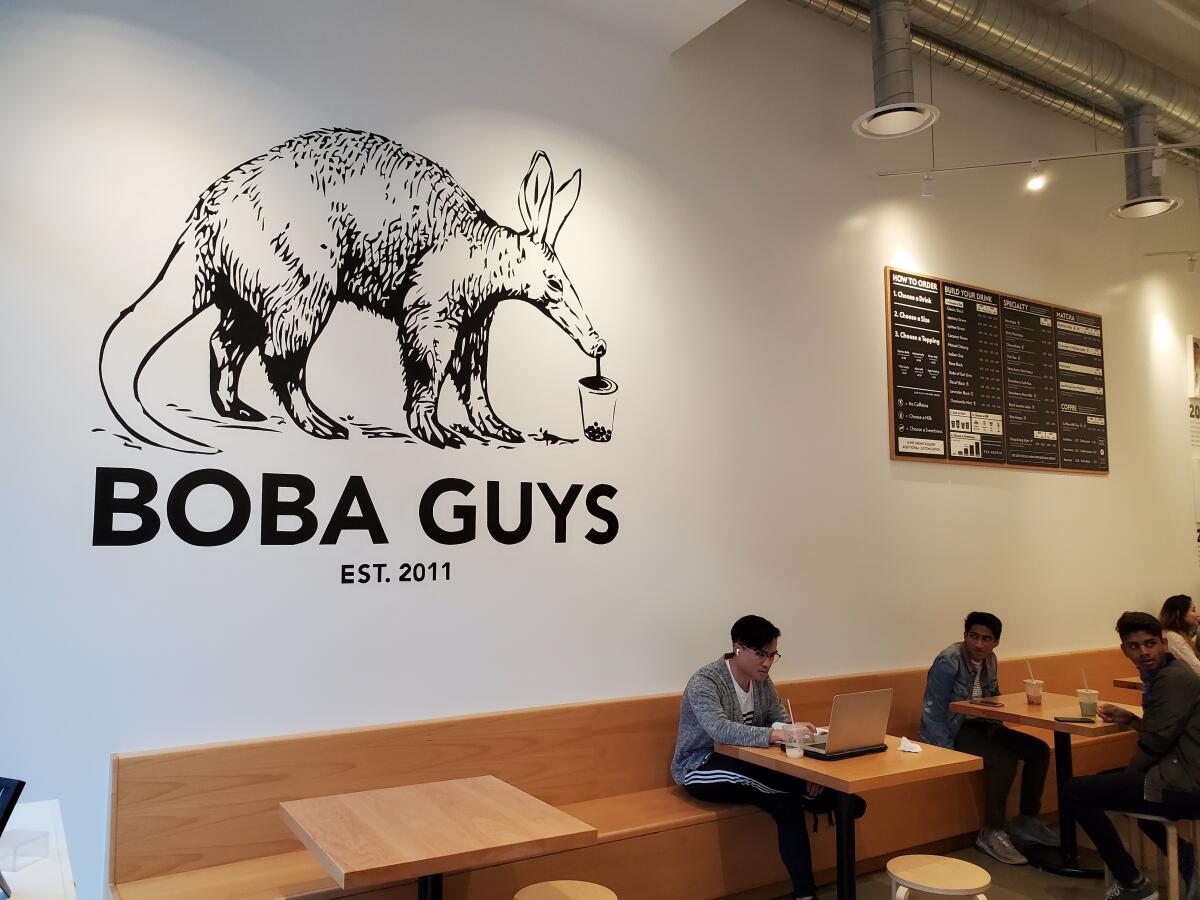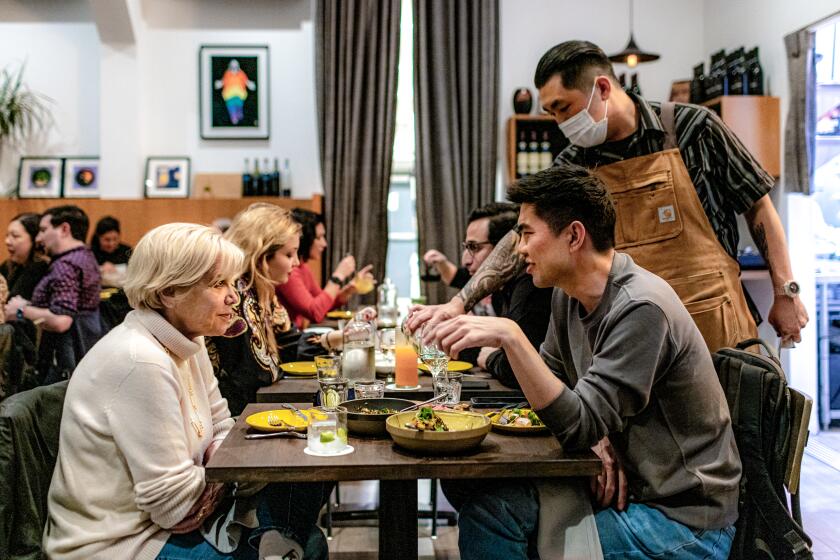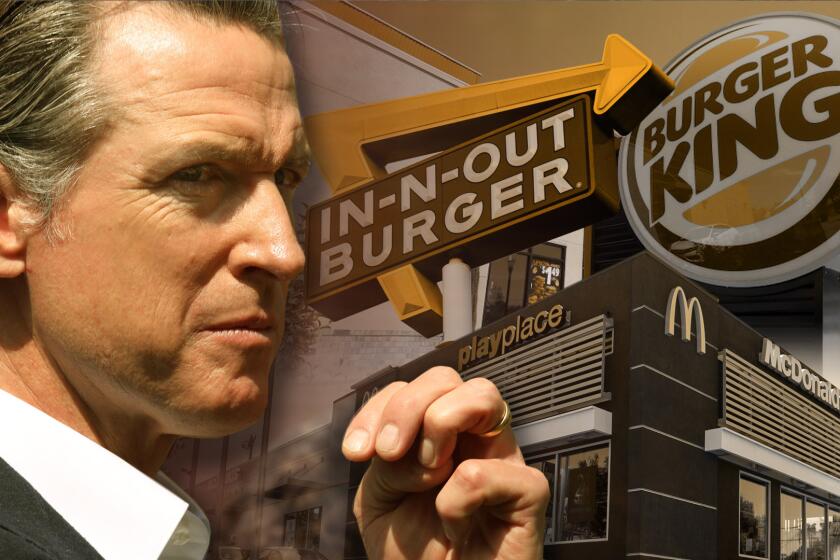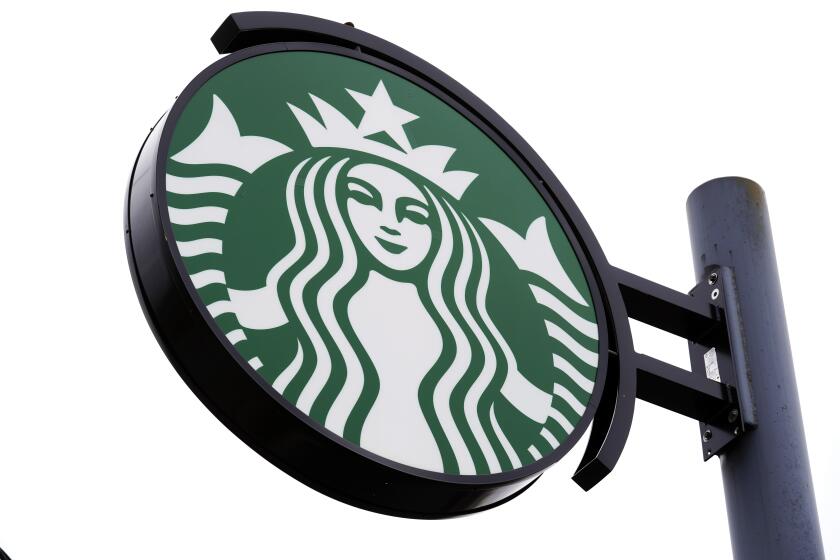Boba Guys bubble tea chain faces worker unrest, social media backlash

- Share via
“Join the boba revolution!” is the catchphrase for Boba Guys, a boba chain begun in San Francisco that has developed a cult following for drinks made with organic milk, loose-leaf teas and homemade syrups.
But the revolution has gotten messy at the chain’s flagship store in San Francisco’s Mission District after some employees pushed back over reduced working hours, began talking about forming a union and posted signs critical of management.
Now the store is temporarily closed and at least one worker has been fired, several more are unsure whether they still have jobs and Boba Guys’ management is being blasted on social media.
The worker unrest at Boba Guys comes during a surge of interest in unions nationwide as workers during the pandemic navigated unstable, potentially dangerous workplaces. Employees of independent businesses and international chains alike are organizing for better protections within the food service industry such as the right to stable shift hours and safeguards against retaliatory actions by management.
Union campaigns at companies such as Starbucks have spread across the country. More than 300 Starbucks stores have held union elections, including more than a dozen locations unionizing in California. Amazon has faced union efforts at a handful of facilities.
Over the summer, workers at Los Angeles Korean barbecue restaurant Genwa formed a union. In 2021, employees of Los Angeles vegan doughnut chain Donut Friend attempted but failed to unionize.
Boba Guys began in 2011 as a pop-up by founders Andrew Chau and Bin Chen when the chilled tea drinks featuring chewy tapioca balls were still a novelty in most of the country. Its first brick-and-mortar store opened in 2013, with the chain now in 24 locations across San Francisco, Los Angeles and New York.
Workers at an air freight hub in San Bernardino accused Amazon of unfair labor practices in a filing with the National Labor Relations Board.
Chau said the company does not comment on personnel matters.
“We are aware of the concerns expressed by some of our San Francisco-based retail team members, and we respect the rights of employees to organize or engage in collective bargaining,” Chau said in an Instagram message.
After a summer of bustling sales, employees at the chain’s flagship store in San Francisco’s Mission District thought the company was doing well. But at the beginning of October, workers said, they were notified of a major cut in hours across the board, a decrease in time given to open and close stores, and fewer people working per shift.
Reducing worker hours and operating with fewer employees are widespread measures taken by businesses facing a tight job market in which wages have been rising.
One worker, Ashley Paredes, said her hours were cut to three a day from 5½, five days a week.
“This triggered confusion, frustration, anger from the team,” said Madeline Urso, 22, a worker who started at the Mission District store in March.
Los Angeles and Orange County restaurants are struggling to find staff, resulting in shortened hours, smaller menus, longer wait times, angry customers.
Several workers said they met Oct. 16 to vent their frustrations to Chau and other members of management. The workers said management was unresponsive to their concerns.
The next day, Urso said, she posted links to a channel in the company’s internal Slack communications system about unemployment resources and union basics.
On Oct. 18, Urso received a disciplinary notice detailing “inappropriate, disparaging” comments that were sexual in nature in a conversation she had with co-workers that was recorded while she was at work.
Urso said those comments, though vulgar, were not uncommon at the store, and were directly critical of Chau, the founder. Urso was then fired, which she believes was retaliation for her Slack postings about union organization. Urso said she does not recall ever having given consent to be recorded at work.
Although firing due to recorded comments is legal if the recording was consensual, if those comments were part of a “concerted activity for mutual aid or protection” on behalf of a group, they are protected by federal labor law, according to Catherine Fisk, a professor of labor law at UC Berkeley.
Gov. Gavin Newsom on Monday signed a nation-leading measure giving more than a half million fast-food workers in California more power and protections, despite the objections of restaurant owners who warned it would drive up consumers’ costs.
A comment can lose its protection if “extremely rude, abrasive, [or] abusive,” but simply using foul language does not make it unprotected, Fisk said.
After Urso was fired, she and other workers went to put up signs at the Mission location that said: “Upper management retaliates against boba employees,” “Boba Guys ‘People Care’ (HR) union busts boba employees,” “Boba Guys employees can’t make rent,” and “Union busters.”
A member of management showed up with police officers, asking them to leave the store, according to Urso and Paredes. A video taken by Paredes shows a San Francisco police officer standing in the doorway of the Mission store.
“When they asked us to leave, we did leave,” Urso said. “Trying to use these officers to intimidate their workers … it felt extremely aggressive, unnecessarily aggressive for what was happening.”
In an email to employees Oct. 19, Boba Guys said the company would be temporarily closing the Mission location until staffing issues were resolved.
“We believe in listening to our team members and engaging with mutual respect and constructive dialogue,” the email said. “It is our policy to treat all personnel matters confidentially and comprehensively. Therefore, we are unable to provide further detail at this time.”
The prevailing narrative says the pandemic gave workers more leverage over their employers. Unfortunately, it’s not true.
Since then, nearly everyone working at the Mission location has lost access to the Slack channel and shift scheduling app — while receiving no notice of their standing in the company, Urso said.
Paredes said she wasn’t allowed to enter the store to collect the tips she had earned during her shift.
At a Boba Guys location in San Francisco’s Union Square, shift lead Jalila Tesoro and two other employees decided to hang up signs Oct. 19 at their store in solidarity with the Mission workers. They said that they, too, were suspended without pay “pending investigation.” The workers said they were told not to enter any Boba Guys stores.
Dozens more former employees have spoken up on Instagram and other social media about working through heat waves without air conditioning, being underpaid for the positions they were working, dealing with vermin and having hours cut when they complained to management.
Their posts have generated significant anger, particularly on Twitter, and the company locked its account so that only approved followers could see its tweets.
“I think this has been a long time coming,” said Xiaojun Zhou, 18, a worker who resigned from the Mission location in solidarity.
“This isn’t the first time a big company has done this to their workers and it won’t be the last, but right now is the time we all stand up against them and that’s what we’ll keep doing,” Paredes said.
It’s not the first time Boba Guys management has come under scrutiny.
In 2020, workers alleged a pattern of racial discrimination and microaggressions toward Black and Latino employees from managers, issues with dealing with racist customers, and lack of support when reporting problems to management.
As a result of social media blowback, a manager who was alleged to have made racist comments in 2018 was fired.
Times staff writer Stephanie Breijo contributed to this report.
More to Read
Inside the business of entertainment
The Wide Shot brings you news, analysis and insights on everything from streaming wars to production — and what it all means for the future.
You may occasionally receive promotional content from the Los Angeles Times.















